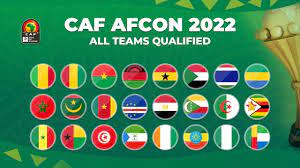By Paul Nicholson
August 17 – After promises of new television deals across the African continent following the disastrous fallout from the Lagardere representation agreement that saw a $1 billion commercial guarantee replaced by blank TV screens and rapidly retreating sponsors, CAF has announced that the Africa Cup of Nations 2022 will be broadcast by the members of the African Union of Broadcasters (AUB).
No figure was announced for the deal that will inevitably be compared to previous broadcasts under Lagardere’s representation that saw coverage in every African nation and into international markets, .
The AUB, headquartered in Dakar, Senegal, is a consortium of public broadcasters covering 45 African states that will bid for collective broadcast rights for its membership who are all free-to-air broadcasters. The AUB generally has a public service programming outlook that is committed to the development of all aspects of broadcasting in Africa including the exchange of indigenous programming, but maintains a commitment to broadcasting events of national importance – when it can afford the rights.
The AUB has joined with the Afrosport rights distribution agency to secure sales to its members.
Gregoire Ndjaka, CEO of the AUB said: “CAF has recognised the unique role that the AUB plays in Africa TV, and we are encouraged by the prospects for public service TV and sports coverage on the landscape. I am glad that to date more than 25 of our broadcast affiliates have reached agreement to televise AFCON 2021, with more expected to sign-up in the coming weeks.”
The 33rd CAF African Cup of Nations (AFCON), will be played from January 9 to February 6, 2022 in Cameroon.
The deal with the AUB gives the competition a potential audience reach spanning more than 120 major cities and many rural communities, the AUB affiliate network reaches over 100 million TV households.
“We are thrilled to deliver what will be Africa’s best ever televised AFCON event,” said Ndjaka.
“In recent times, it has been well publicised that events have not been well served, due to uncertainty in the rights process leading to many broadcasters not signing up to the event until, destabilising the commercial viability of the broadcast and hindering the viewer experience.”
The AUB also said it will support CAF’s school football development and the recently announced African Super League project.
No acquisition figures have been announced or detail on any guarantees the AUB might be providing. It is unlikely that the AUB is paying near to what the commercial broadcast market was previously paying for AFCON. But it is nevertheless a significant switch from commercially driven networks that pay for major rights to public service broadcast channels that have increasingly been challenged with budgets in competitive rights situations but can deliver a broader audience reach.
Andy Howes, Co-Founder and Executive Director of Afrosport, said: “Afrosport is excited for the opportunity to work with the AUB and its network of public service and private broadcasters to deliver the best collective sporting experiences to Africa’s viewers. Together we will seek to leverage a network of key media partnerships to unlock the true commercial potential of sport through the engagement of the continents 1.3 billion people and 800m TV audience.
“For CAF our objective is simple: to deliver Africa’s biggest sporting spectacle through the biggest broadcast media platform on the continent, creating Africa’s biggest sporting conversation.”
Contact the writer of this story at oc.ll1713912883abtoo1713912883fdlro1713912883wedis1713912883ni@no1713912883slohc1713912883in.lu1713912883ap1713912883

